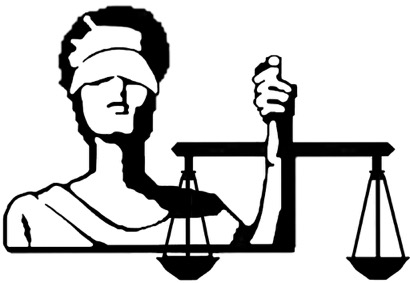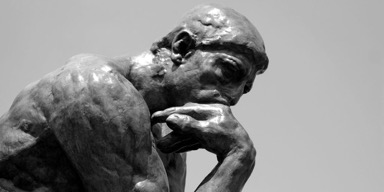8- NotSupposedTo

"If I won't say it, who will?"
As a part of our initial client interviews when consulting, The Muse and I would eventually get around to asking what we could not talk about. Recognizing that we were aliens in each client's organization, and as aliens, we were likely to violate at least one invisible rule, we asked. Most hiring executives would quickly respond that anyone could talk about absolutely anything in THEIR organization, but even the client knew that was bullshit. Often, the hiring executive had no clue what couldn't be talked about. The smokers on the loading dock know only too well, for they carry more experience talking big, at least as long as the executives aren't in earshot.
My Eighth Ethical Responsibility of 'Project' Work, one I include at The Muse's emphatic insistence, reminds me that I have to Talk About What I'm Not Supposed To Talk About.
7- MakeInformedChoices

"Make The Best of the curious choices life brings you."
My Seventh Ethical Responsibility of 'Project' Work insists upon my Making Informed Choices. This one might require a bit more explaining than any of the other Responsibilities because it's subtle and tricky. Enjoining anyone to make only informed choices seems like a double binding insistence because how could anyone possibly determine that they were properly informed at any choice point? Choices, like so much in 'project' work, seem to come at inconvenient and inconveniencing times, insisting upon a snappy response, the kind that generally obviates the ability to fully consider alternatives. Only scant information seems available and a decision needs to be taken. What kind of informed choice could that situation produce? The answer is: the usual kind.
Almost nothing decided in the course of any 'project' benefits from full discovery. Partial pictures produce fragmented understandings which unavoidably generate crappy options from which to choose.
6- SitWithTheMess

"It's still a wrestling match with myself most every time …"
'Projects' tend to spawn messes. What might have been envisioned as a straight-forward, even trivial effort manages to somehow find its share of complications. The easier it seems to be at first, the more complicated it's likely to become, if only because the expectations we set couldn't help but leave everyone wide open for some big surprises. Almost any hill looks less steep from the foot of it, also less tall. It's not until one gets about halfway up that any truer nature of the effort comes into focus. Mentioning these likely complications at the beginning will usually earn one the label of Chicken Little. Nobody will fondly remember your earlier cautions later, either.
Some new mess seems to be delivered to your door with each fresh dawn, each pleading for a speedy response. Few deserve a quick, reactive intervention, though, and not just because these tend to complicate messy situations.
5- Work The System

"Had I expected the system to work without me working it a bit?"
No system ever devised worked as intended. Each embodied some flaw or feature producing different than intended responses. We adapt around these shortcomings until we become largely unaware of their presence. Encountering any new system inevitably becomes an at least somewhat frustrating series of learnings which we experience as mistakes until we figure out the fiddles and somehow seamlessly incorporate them into our repertoire. Some systems seem especially blessed with a seemingly intransigent nature. These, we never completely learn and so we struggle with them. Math was like that for me. So is the thermostat with the inhuman human interface. Each encounter with these systems involves essentially starting tabula rasa all over again.
We develop shortcuts and co-opts over time. We come to more deeply understand a system's tolerances, those points where a corner might be successfully shaved.
4-GenerousInterpretations

" … never ascribe to evil intent what simple incompetence might explain."
My fourth Ethical Responsibility of 'Project' Work encourages me to at least consider Making The Most Generous Possible Interpretation. My natural interpreter tends to lean toward the more scathing, if only because scathing interpretations generate more entertainment value. Scathing interpretations rarely well serve any relationship. Unless you're surrounded by limping battalions of demonstrated sociopaths (see 3-ExtendingTrust), scathing interpretations seem imprudent. Was that component delivered late because of incompetence or a bit of bad luck? You decide, but you must decide with inadequate evidence. Will your collective effort be better served by a scathing or a more generous interpretation?
The rub, of course, seems to be that most of a 'project's' conclusions must be drawn with less than sufficient evidence. If there's no such thing as a 'project', there's also, usually, no such thing as a real root cause.
3-ExtendingTrust

"I might better serve myself and our collective effort
by sharing the benefit of my initial uncertainty …"
Lore holds that people must prove themselves trustworthy before one should extend them trust. This notion can easily complicate any 'project' assignment as everyone eyes each other suspiciously at first. I never could figure out what might constitute the appearance of trustworthiness, though. If a team member pulls off some selfless public rescue, I suppose that I might find it easy to trust them, but most team members keep their heads down and I'm unlikely to glimpse them demonstrating heroic behavior, so how might they prove themselves trustworthy in my eyes if I'm uncertain what trustworthy even looks like? Besides, the mere absence of evident behavior says little about anything.
I believe that the lore mistakes a sort of naive hopefulness for trustworthiness.
2-PurposefulPursuit

"I need not become an obsessed true believer …"
I find it extremely difficult writing about PurposefulPursuit without resorting to hackneyed synonyms. The term dredges up determined, recalls resolute and resolved, and sings of steadfastness and single-mindedness. Sticking no more than a toe in that water seems to infect me with a full-blown case of OCD, and I want to avoid that end. Of course 'projects' would operate more smoothly if everyone involved in the effort would become obsessed with achieving the objective. They will not. Contrary to popular conviction, one cannot drive any 'project' to a successful conclusion. Driven behaviors, whether exhibited by the 'project' leader or a particularly compulsive individual contributor seem more akin to bullying, a form of public self abuse.
When I speak of PurposefulPursuit as the second of my Ethical Responsibilities of 'Project' Work, I am most decidedly not merely trying to egg myself on by whispering a motivational mantra.
1-ConsciousBlindness

"I feel better informed when I presume that I'm less than fully informed."
This posting represents the first of seven (or maybe eight) pieces reconsidering my Seven Ethical Responsibilities of 'Project' Work.
In the beginning, I understand that there was nothing but The Word, which could not have even been a thing since words have no existence without several sorts of context like paper, screen, speaker, listener, alphabet, and history to hold meaning. Though there were apparently no observers present, save The One, certainly no journalists or diarists, the story stuck. Later, light emerged, attributed to an early act of God, back when he was still building his vitae. He, the Creator, proclaimed light good, though later reviews were mixed. All this occurred before God even married the first time. God's second wife, certainly significantly younger than he and probably uncomfortably closely related, was beautiful, but they lacked a shared experiential history. They struggled with metaphors, he continually referencing outside her cultural experience, she insisting upon quoting younger notables that he considered mere wannabes. That marriage, too, was fated to fail.
God's third wife came along just as he began to come into his Almighty phase, having by then fathered a son by his second ex-, Mary.
ProjectPhD

"I suspect that most ethical lapses emerge as sins of omission …"
Whenever I ask a 'project' worker about their philosophy of 'project' work, I almost always receive a long stare in reply. A few, like me, might fumble for our little laminated card which holds our intentions in the odd chance that they might be of some practical use, but most, if they've even thought about their personal philosophy of 'project' work will offer no crisp response. Some might offer a variant on The Golden or the Platinum Rules, do unto others as you'd like to be done unto or do unto others as they wish to be done unto, but little practical light will shine from beneath their bushel baskets.
I'll quick draw my Seven Ethical Responsibilities of 'Project' Work, an explication I developed with considerable effort.


